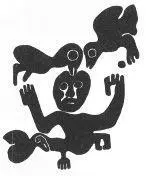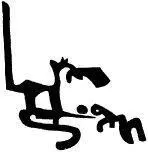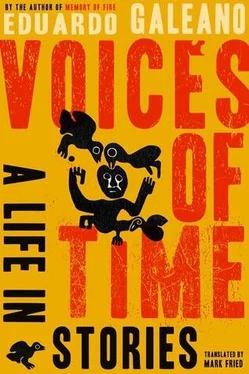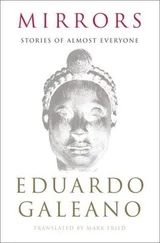“That’s what I do,” stammered Bernal.
He answered by a miracle. He was but the remains of himself.
Nelly Delluci crossed barbed-wire fences and pastures looking for a concentration camp called the Little School, but the Argentine army had left not a brick standing.
All afternoon she wandered about, searching in vain. When she was lost as could be in the middle of an open field, Nelly spied the windmill. She saw it in the distance. As she approached, she heard the creaking of the sails in the wind and she was certain.
“It was here.”
There was nothing but grass around her, but this was the place. Standing in front of the windmill, Nelly recognized the sound that fifteen years before had kept her and the rest of the prisoners company, day after day, night after night, while torture ground them to bits.
And she remembered that a colonel, fed up with the windmill’s unceasing complaints, ordered it handcuffed. Rope was looped several times around the sails to hold them fast. The windmill kept moaning.

He got out, but he stayed behind. Fray Tito was free, in exile in France, but he remained imprisoned in Brazil. His friends confirmed what the maps told him, that the country of his executioners lay on the far side of the ocean, but that did not help. He was the country where his executioners lived.
He relived his hell every day. Everything that had happened, happened all over again. For more than three years, his torturers never let up. Wherever he was, in the convents of Paris and Lyon, or in the countryside of southern France, they kicked him in the stomach and cracked him across the head with their rifle butts, they stubbed out cigarettes on his naked body, and stuck cattle prods in his ears and mouth.
And they never shut up. Fray Tito was bereft of silence. In vain he wandered in search of some place, some corner of the church or the earth free of the horrible screams that would not let him sleep, would not let him say the prayers that had once been his magnet for God.
He could not go on. “Better to die than to lose your life” were the last words he wrote.
At noon, in a beer hall on the docks of Hamburg, two men were drinking and talking. One was Philip Agee, the former CIA station chief in Uruguay. The other was me.
The sun, not a very frequent visitor to those latitudes, bathed the table in light.
Between beers, I asked him about the fire. Years before, £poca, the newspaper where I worked, had gone up in flames. I wanted to know if that had been a little present from the CIA.
No, Agee told me. The fire was a gift of Divine Providence. And he added, “They gave us a fabulous ink for incinerating printing presses, but we didn’t get the chance to use it.”
The CIA failed to place a single agent in our print room. The foreman, Agee acknowledged, was “a great goalkeeper.”
Yes, I said. He was.
Gerardo Gatti, with that chronic and incurable smile in his eyes. Yes, he was a great keeper. And he also knew how to attack.
When Agee and I met in Hamburg, Agee had broken with the CIA, a military dictatorship was governing Uruguay, and Gerardo had long since been kidnapped, tortured, murdered, and disappeared.
In Guatemala, under the military dictatorship, the daughter of Don Francisco was captured in the Chuacus Mountains. Before dawn, an army officer dragged her to her father’s door.
The officer interrogated Don Francisco. “Is it wrong what the guerrillas are doing?”
“Yes. It’s wrong.”
“And what should be done with them?”
Don Francisco did not answer.
“Should they be killed?” the officer demanded.
Don Francisco remained silent, his eyes on the ground.
His daughter was on her knees, hooded, handcuffed, a pistol at her head.
“Should they be killed?” the officer insisted.
Again and again. Don Francisco still said nothing.
Before the bullet shattered the girl’s skull, she wept. Under the hood, she wept.
Carlos Beristain told me this story. “She wept for him,” he said.

Death wears a thousand colors in the cemetery of Chichicastenango. Perhaps these flowering tombs celebrate the end of the earthly nightmare, this bad dream of bullies and bullied which ceases when death, in one blow, strips us naked and makes us all equals.
I don’t see a single headstone from 1982 or 1983, the time of the great killings in the indigenous communities of Guatemala. The army threw those bodies into the sea, or into the mouths of volcanoes, or burned them in who knows what common graves.
The joyful colors of the tombs of Chichicastenango salute death, the Equalizer, who treats beggar and king with the same courtesy. Missing from the cemetery are those who died for wanting life to do the same.

He hadn’t been at the factory long before a machine bit his hand. A thread had got away, and in his attempt to catch it he got caught.
He didn’t learn. Hector Rodriguez spent his entire life reaching for dropped threads, organizing unions, gathering the dispersed. Throughout his years on the blacklist and his years in jail, he risked his hand and everything else to weave together what fear had unraveled.
When his days came to an end, a large group of us waited for him at the cemetery gate. Hector was to be buried on the hill above Buceo Beach. We’d been there quite a while on that gray and windy day, when several cemetery workers turned up carrying a casket but without flowers or mourners. A number of us who had been waiting for Hector formed a cortege behind them and went in.
By mistake? Did we follow the wrong casket? Who knows? It would have been just like Hector to offer his friends to the one who was all alone.
Carlos Fasano spent six years conversing with a mouse and with the door of cell number 282.
The mouse wasn’t very faithful, scurrying in and out at will, but the door was always there.
Later on, the prison was turned into a shopping center. From lock-up to buy-up; its cells no longer held people but Armani suits, Dior perfumes, and Panasonic VCRs.
The doors ended up in a junkyard.
There, Carlos found his door. It had no number, but he recognized it straightaway. Those were the gashes he’d made with his spoon. Those were the old stains in the wood, maps of secret countries he traveled to during each of the long days he spent in confinement.
Now the door stands in the open, at the top of a hill, where closing is forbidden.

He fought, was wounded, got caught.
After the torture chamber, he was pretty much dead when a military court decided he should die altogether.
He knew he was alone. What remained of him had been forgotten by his comrades.
Utterly forsaken, he waited for death to finish the job.
In the solitude of his cell, he talked to the wall.
But the end of the war got there before death did, and he was set free.
Читать дальше
















